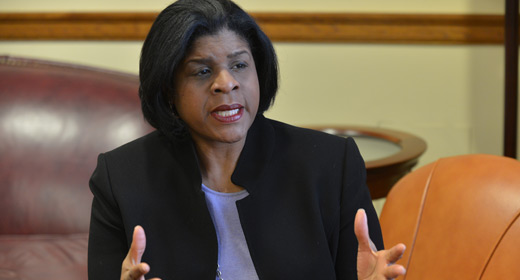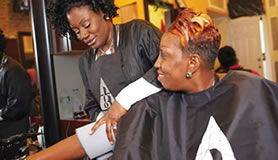
Ruth Browne (MPP/MPH '83) just did the happy dance. She's celebrating a gift to the Arthur Ashe Institute for Urban Health, an institute she's directed since its founding in 1992 by the legendary African American tennis star and humanitarian. This moment of unguarded delight is particularly endearing in Browne because her public persona is all polish and professionalism. It has to be. As CEO of an internationally recognized nonprofit leader in community-based health interventions, Browne knows how important the institute's work is to economically disadvantaged communities of color and poverty, which suffer a disproportionate share of preventable illnesses like heart disease, asthma, and diabetes.
How does the institute battle these preventable diseases in communities with less reliable access to health care and greater exposure to stress and environmental hazards? To hear Browne tell it, the work is simple: it harnesses the power of community.
"Every community has assets–trusted mentors, business leaders, church leaders–the institute gives them the tools, resources, and support they need to leverage those assets," says Browne, "so they can be more proactive about their health, the health of their families, and the health of their communities."
Among the community leaders the institute trains are barbers and hair stylists. Hair stylists? Really? Absolutely, says Brown. "Most African American women have a traditional place for hair care, but not health care."
The Arthur Ashe Institute trains barbers and stylists in more than 400 salons in Brooklyn, Queens, Manhattan, and Philadelphia to talk to their clients about heart disease risk factors. Stylists are taking blood pressure, encouraging clients to get cholesterol checks, sharing health information, and suggesting diet and behavioral changes that can lower risk. In 2011, in preand post-study surveys of test and control groups, participants in the three-month intervention reported a 60 percent increase in healthy behaviors such as dieting and exercise.
 |
|
The institute trains community leaders—including hair stylists and barbers—to conduct health promotion programs throughout Brooklyn. |
In 1994, just two years after the institute's founding, Browne helped launch another of its signature programs, an after-school enrichment program designed to inspire more minorities to enter health and science professions and return to their own communities to share their skills. To date, 99 percent of the institute's graduates have gone on to college and 60 percent (ten times the national average) have entered bachelor's programs in science and health fields.
Interestingly, Browne's own career has followed a similar trajectory. She grew up in Brooklyn; went away to college (to Princeton for her undergraduate degree, the University of Michigan for her master's, and Harvard for her doctorate); then ran public health training programs in Jamaica, and social and health policy programs for Mayor Koch and Governor Cuomo in New York city and state. Browne then returned to run the Arthur Ashe Institute for Urban Health–just five blocks away from the Flatbush, Brooklyn, home where she grew up.
Photo: Yvonne Albinowski
Below is a formatted version of this article from State & Hill, the magazine of the Ford School. View the entire Spring 2013 State & Hill here.
